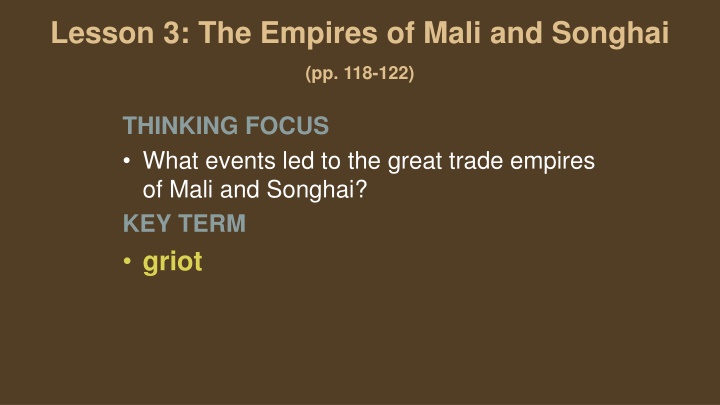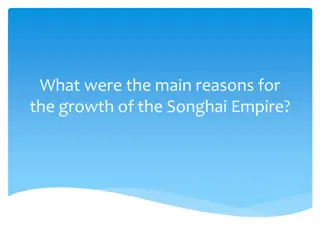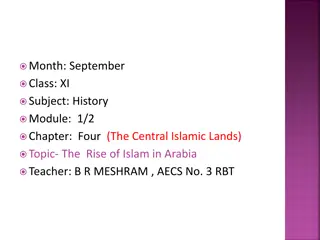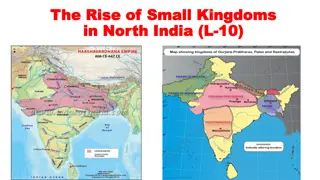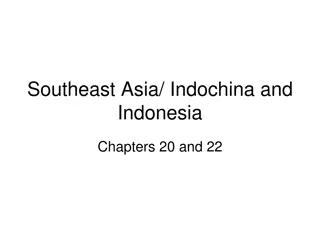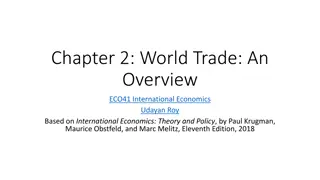The Empires of Mali and Songhai: Rise of Prosperous Trade and Powerful Kingdoms
Mali and Songhai rose to prominence through events like King Sundiata's defeat of Ghana, leading to prosperous trade in gold and salt, and Mansa Musa's expansion and enrichment of the empire. Griots played a key role in passing down the stories of these empires, showcasing their cultural significance in West African history.
Download Presentation

Please find below an Image/Link to download the presentation.
The content on the website is provided AS IS for your information and personal use only. It may not be sold, licensed, or shared on other websites without obtaining consent from the author.If you encounter any issues during the download, it is possible that the publisher has removed the file from their server.
You are allowed to download the files provided on this website for personal or commercial use, subject to the condition that they are used lawfully. All files are the property of their respective owners.
The content on the website is provided AS IS for your information and personal use only. It may not be sold, licensed, or shared on other websites without obtaining consent from the author.
E N D
Presentation Transcript
Lesson 3: The Empires of Mali and Songhai (pp. 118-122) THINKING FOCUS What events led to the great trade empires of Mali and Songhai? KEY TERM griot
Mali Develops a Prosperous Trade In 1235, King Sundiata of Mali defeated King Sumanguru of Ghana and established his capital at Niani, on the Niger River.
GOLD & SALT Sundiata improved agriculture and restored the region's gold and salt trade, making Mali the most powerful kingdom in Africa.
Mandinke griot, or storyteller. Example The vanquished Sumanguru looked up towards the sun. A great black bird flew over above the fray...."The bird of Kirina," [the king] muttered. Sumanguru let out a great cry and, turning his horse's head, he took to flight.
Mali Develops a Prosperous Trade Sundiata became king of the new empire of Mali, which had once been a part of Ghana. Sundiata first concentrated on improving agriculture. His soldiers cleared land for farming, and they planted rice, yams, onions, beans, grains, and cotton. In a few years, Mali became a productive farming region.
Camels are still important Sundiata and his successors expanded Mali's trade routes north and east across the Sahara to Cairo, Egypt, and to Tunis in Tunisia. Less than 100 years after the victory at Kirina, Mali had become the most powerful kingdom in Africa. By the late 1300s, Mali was three times as large as Ghana had ever been.
Mansa Musa Enriches the Empire Mali's greatest ruler, Mansa Musa, expanded trade, encouraged Islam, and enlarged the empire. Under Mansa Musa, rich trading cities such as Timbuktu and Niani became centers of culture and learning.
Mansu Musa was a Muslim in accordance with Islamic teachings, some of Mali's rulers made pilgrimages to the holy city of Mecca in the Middle East. Mansa Musa made the 3,500-mile journey in 1324. According to some accounts, which may have become exaggerated over time, Mansa Musa was accompanied on this journey by as many as 50,000 people-- friends, family members, doctors, advisers, and 500 slaves carrying golden staffs. In addition, 80 to 100 camels, each loaded with 100 pounds of gold dust, are said to have traveled with him to Mecca. Hundreds of other camels carried the other supplies.
Even Mali's borders expanded under Mansa Musa's rule. New land was acquired both peacefully and as the result of war. Most of Mali was divided into states, which were under Musa's control. Other religions had to pay taxes (not religious freedom)
Power Shifts to Songhai After Mansa Musa died in 1332, Mali was ruled by a series of kings who were unable to protect its vast territory. Mali gradually weakened and eventually was taken over by neighboring Songhai, a former province of Mali. The Songhai were a mixture of farmers, traders, fishermen, and warriors who lived along the Niger near the city of Gao.
The Kingdom of Mali Ghana was prosperous for about 700 years until it was weakened by wars and replaced by the state of Mali, established in the mid thirteenth century by Sundiata Keita.
Sundiata Keita Sundiata Keita is considered to be the founder of his nation. He defeated the forces of Mali in 1240 and established the capital of Timbuktu. Mali built its power on gold, similar to Ghana, but most of its people worked as farmers.
The Reign of Mansa Musa Mansa Musa One of the richest and most powerful kings of Mali, he ruled from 1312 to 1337. Created a strong central government and divided his kingdom into provinces. Once he felt secure he left to go on Hajj.
Mansa Musas Hajj Mansa Musa s Hajj was a great undertaking. He spent large amounts of gold while he made his pilgrimage to Mecca, so much so that he lowered the price of gold by putting so much into circulation. He was also inspired by his journey to make Timbuktu a center of Islamic learning and culture so he built great mosques and libraries.
Fall of Mali Mansa Musa was the last of the powerful rulers of Mali. In 1359 civil war tore Mali apart. Within a hundred years the new kingdom of Songhai rose to take its place.
The Kingdom of Mali Atlantic coast inland to Timbuktu. Sundiata defeated Ghanaians, united Mali people and created a strong central government. Most people farmers. Built their wealth on salt & gold. Villages had local leaders who were both religious & administrative leaders. Collected taxes & sent the taxes to the kings of Mali. Richest & most powerful king was Mansa Musa. Ruled 30yrs., doubled size of kingdom, & divided kingdom into provinces ruled by governors. Was Muslim & made pilgrimage to Mekkah. Brought back architects to build mosques & a palace.
What river was important to both Ghana and Mali? Niger River
What religion influenced both Ghana and Mali? Islam
How did the location of cities in the West African empires of Ghana and Mali influence their growth? They were new trader routes
Based on the map, what advantage to Mali have over Ghana?
Who made a famous pilgrimage to Mecca? Mansa Musa
How did Mansa Musa help develop the empire of Mali? His pilgrimage to Mecca encouraged traders, scholars, and artists to come to Timbuktu.
